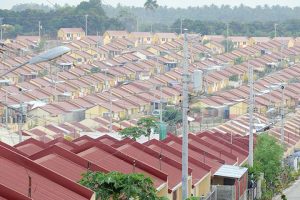LEGISLATORS should fast-track the passage of a measure that lays down the policy for land use, according to the Philippine Institute for Development Studies (PIDS).
It said the creation of an objective plan to utilize the land will address the scarcity of land resources as well as penalize illegal and damaging uses of land.
“Land use conflicts stem from competing demands of land resources including food production, water security, housing, industry and ecological services,” PIDS President Ancieto C. Orbeta, Jr. said during the government think tank’s “State of Land Use Policy and Governance in the Philippines” forum on Monday.
Proposals for a national land use plan, which seeks to establish parameters for land use to address the unequal distribution of economic resources, have been stuck in Congress for nearly three decades.
“This legislative gap has a wide-reaching impact beyond just land use conflicts. It adversely affects watershed management, leading to environmental degradation that exacerbates soil erosion, flooding, and affects water resources and quality,” Mr. Orbeta said.
The National Economic and Development Authority (NEDA) Board-National Land Use Committee, which is the main policy-making body on land use, does not have the power to penalize public officials and private parties that misuse land.
Rex Victor O. Cruz, professor emeritus at the University of the Philippines Los Baños College of Forestry and Natural Resources, said vested interests hinder the passage of a national land use policy.
“It’s an issue of power distribution among stakeholders… that’s a barrier I think that has been there for a very long time,” Mr. Cruz said.
House Bill No. 8162, which the House of Representatives passed last year, details how land can be distributed among key sectors as well as protect critical areas.
The bill proposes the creation of a National Land Use Commission, which will be tasked to formulate the National Physical Framework Plan. The plan would have a 30-year timeline and must be updated every 10 years.
Three land use measures remain pending at the Senate environment, natural resources, and climate change committee, headed by Senator Cynthia A. Villar.
“The irony is that the sub-optimal utilization of land is happening alongside stark manifestations of unmet basic need for land such as socialized housing for the homeless,” PIDS senior research fellow Adoracion M. Navarro told the forum.
Rafael Vicente Dimalanta, research analyst at the University of the Philippines Center for Integrative and Development Studies, said pushing for a national land use plan would include inputs to urban planning and housing especially from the poor and marginalized.
He cited how residents of the urban poor community Sitio San Roque were “subjected to divisive tactics” for eviction to give way to nearby urban development plans.
As of November 2022, only 311 out of 1,634 local government units (LGUs) have shelter plans, according to the Department of Human Settlements and Urban Development.
The Philippine Statistics Authority has called land use in the Philippines between 2015 and 2020 “non-optimal.”
Ms. Navarro said passing a national land use policy will not weaken the powers of LGUs in land planning.
“We need to lay down a proposal for upgrading the technical capacity of LGUs in formulating, updating, and implementing comprehensive land use plans and provincial development and physical framework plans,” she said. — Beatriz Marie D. Cruz
